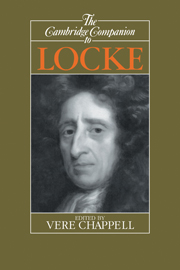Book contents
- Frontmatter
- Introduction
- 1 Locke's life and times
- 2 Locke's theory of ideas
- 3 Locke's philosophy of body
- 4 Locke's philosophy of mind
- 5 Locke's philosophy of language
- 6 Locke's theory of knowledge
- 7 Locke's philosophy of religion
- 8 Locke's moral philosophy
- 9 Locke's political philosophy
- 10 Locke's influence
- Bibliography
- Index
10 - Locke's influence
Published online by Cambridge University Press: 28 May 2006
- Frontmatter
- Introduction
- 1 Locke's life and times
- 2 Locke's theory of ideas
- 3 Locke's philosophy of body
- 4 Locke's philosophy of mind
- 5 Locke's philosophy of language
- 6 Locke's theory of knowledge
- 7 Locke's philosophy of religion
- 8 Locke's moral philosophy
- 9 Locke's political philosophy
- 10 Locke's influence
- Bibliography
- Index
Summary
John Locke is the most influential philosopher of modern times. His Essay initiated the vigorous and lasting philosophical tradition that is known as British empiricism, but Locke's importance reaches far beyond the limits of what has since his time become recognized as the professional discipline of philosophy. His influence in the history of thought, on the way we think about ourselves and our relations to the world we live in, to God, nature and society, has been immense. His great message was to set us free from the burden of tradition and authority, both in theology and knowledge, by showing that the entire grounds of our right conduct in the world can be secured by the experience we may gain by the innate faculties and powers we are born with. God “commands what reason does” (W VII: n ) are the words that best reveal the tenor and unity of Locke's thought.
- Type
- Chapter
- Information
- The Cambridge Companion to Locke , pp. 252 - 289Publisher: Cambridge University PressPrint publication year: 1994
- 11
- Cited by

